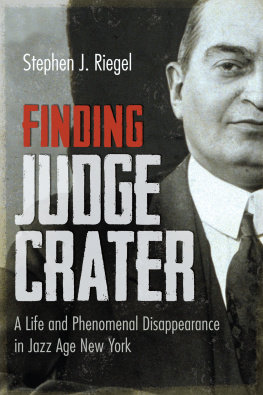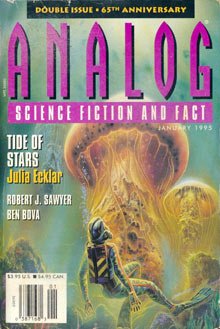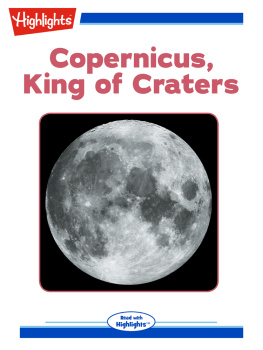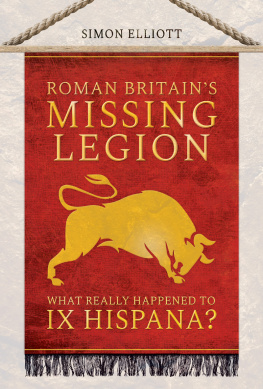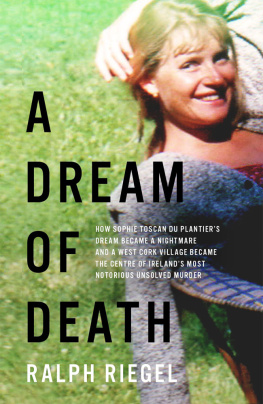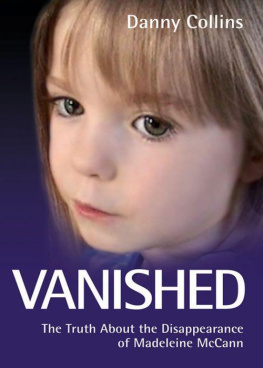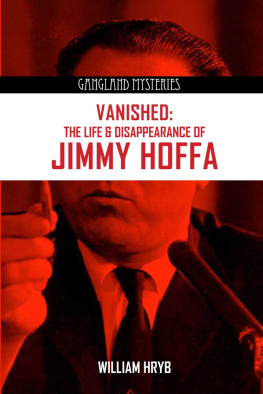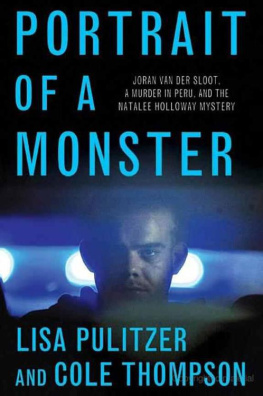Table of Contents
Guide
Page List



Copyright 2022 by Syracuse University Press
Syracuse, New York 13244-5290
All Rights Reserved
First Edition 2022
22 23 24 25 26 27 6 5 4 3 2 1
The paper used in this publication meets the minimum requirements of the American National Standard for Information SciencesPermanence of Paper for Printed Library Materials, ANSI Z39.48-1992.
For a listing of books published and distributed by Syracuse University Press, visit https://press.syr.edu .
ISBN: 978-0-8156-3719-6 (hardcover)
978-0-8156-1134-9 (paperback)
978-0-8156-5538-1 (e-book)
Library of Congress Cataloging in Publication Data
Names: Riegel, Stephen J., author.
Title: Finding Judge Crater : a life and phenomenal disappearance in jazz age New York / Stephen J. Riegel.
Description: First edition. | Syracuse, New York : Syracuse University Press, 2022. | Includes bibliographical references and index. | Summary: Riegels work discusses the unsolved 1930 disappearance of Supreme Court Justice and prominent political player Joseph Crater and sifts through the many theories surrounding his disappearance, as well as previously untapped sourcesProvided by publisher.
Identifiers: LCCN 2021026195 (print) | LCCN 2021026196 (ebook) | ISBN 9780815637196 (hardcover) | ISBN 9780815611349 (paperback) | ISBN 9780815655381 (ebook)
Subjects: LCSH: Crater, Joseph Force, 1889 | JudgesNew York (State)New YorkBiography. | Missing personsNew York (State)New YorkCase studies.
Classification: LCC KF373.C68 R54 2022 (print) | LCC KF373.C68 (ebook) | DDC 347.747/0234 [B]dc23
LC record available at https://lccn.loc.gov/2021026195
LC ebook record available at https://lccn.loc.gov/2021026196
Manufactured in the United States of America
To Anne, with love and gratitude
CONTENTS
ILLUSTRATIONS
(following page 122)
ACKNOWLEDGMENTS
This book would not have come to fruition without the help of many dedicated librarians and archivists. To name just a few (and my apologies for leaving anyone out): I thank Kenneth Cobb and his assistants at the New York City Municipal Archives for steering me to court and municipal records, which greatly clarified the complex Libbys Hotel proceedings. I thank the librarians at the Rare Book and Manuscript Library of the Columbia University Library for assisting my research in the Edwin Patrick Kilroe Papers, an amazing collection of correspondence, campaign materials, newspaper clippings, books, and manuscripts relating to Tammany Hall from its inception through the 1950s, compiled by its long-time secretary and archivist. Thanks also to Mark Swartz and Maryann Chach of The Shubert Archive who helped me with materials on the Shubert brothers and their shows in the 1920s which Crater regularly attended, as well as on his friend William Klein, the Shuberts chief counsel and the last person to see him before he disappeared. Mark arranged for publication of my article about Klein and Crater in the archives periodical, The Passing Show, in 2015, and provided permission to reprint images from the archive in this book. Librarians at the Easton (PA) Public Library were helpful in directing me to sources of information about Craters childhood there.
I want to thank the New York City Police Department for making the remaining internal files in Craters case available by request under the Freedom of Information Law (FOIL). These files, never before used in a nonfiction account of the case, were essential for accurately portraying the lengthy manhunt and clearing up discrepancies in contemporary news reports of the case, as well as for understanding the later developments in the case in the 1950s, which are presented in . Members of the FOIL unit of the NYPD were gracious in providing time for me to review the case file and making me copies of much of it. The Federal Bureau of Investigation also made available copies of its files on the Crater case. Im also grateful that I had the opportunity to interview the late Judge Simon Rifkind in 1993, who initially reported to the NYPD that Crater was missing and shared his impressions of his good friend and legal colleague, his beliefs about what happened to him, and why the search was unsuccessful.
I owe the deepest debt of gratitude, however, to members of my family who were unfailingly encouraging over the long trek to get this book published while I was engaged in my law practice. I want to thank my parents, Claire and Herbert Riegel, for their continual support.

